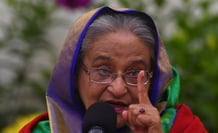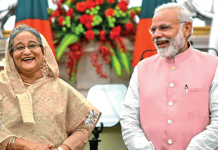
Of course, the phrase ‘trial by media’ has become much known in the world recently. In fact, many experience media trials in different countries in the world including Bangladesh. One of the recent most notable events in Bangladesh is the event of Pori Moni who was arrested from her home a few days ago. Both printed and electronic media covered a range of previously unknown facts about her. Of course, such sort of coverage is not new at all in Bangladesh. But the coverage of the facts of Pori Moni in the mainstream and social media has by this time led some to raise the issue of media trail in Bangladesh anew.
Notably, media trial is broadly defined as the process in which the media takes a case in its own hand and declares a person(s) either as guilty or not guilty before or after the verdict of the court. Alternatively saying, it occurs when media — directly or indirectly — declare someone as guilty or innocent or create a widespread perception of guilt or innocence before, or even after, the verdict of the court, intentionally or unintentionally. Instead of focusing on the establishment of accused persons as innocents, the meaning of media trials can sometimes refer to the coverage that makes accused persons guilty before the verdict. For instance, the Indian Supreme Court defines media trial as “the impact of television and newspaper coverage on a person’s reputation by creating a widespread perception of guilt regardless of any verdict in a court of law”. Of course, media trail is usually affiliated to renowned or high profile persons, although it may also occur for persons previously unknown publicly.
But an important question can be raised on whether media trial — the coverage on pending cases and the coverage of arrested persons before filing a case — is justified. Even if it is justified, how much is it? Even if it is not justified, how much isn’t it? From the legal point of view, media trial is undesired because it violates fundamental rights. Most important of all is that media trials can give an unfair portrayal of accused persons that can result in the violation of the right to a fair trial — a fundamental right acknowledged in the national constitution, especially in Article 35(3). Also, media trials based on post-arrest briefings or any other sort of sensational journalism especially on sexual offenses or facts that are divulged in the public domain contradicts the right to privacy, another very important right.
Of course, there is a wide range of criticisms of media trials across countries including Bangladesh. It is often criticized that media trials can influence the potential verdict of a given case by providing fabricated information in favor of or against an accused person — intentionally or even unintentionally. This may undesirably help make innocent persons guilty and guilty persons innocent in the actual verdict. Moreover, there are some other negative impacts including impacts on the reputation of persons. On some occasions, widespread unauthentic or fabricated information of innocent persons revealed by journalism, which is a powerful process that affects and moulds public opinion, may lead to the negative image of accused persons in society, although the verdict of the court can eventually and rightly declare those persons as innocents. Consequently, accused persons may be neglected in society and/or may count other social losses.
On the contrary, media deserves the right to disseminate information of diverse sorts. Indeed, the constitution of Bangladesh especially Article 39 provides freedom of the press. Freedom of press provides diverse scopes including the presentation of verified information and expression of debates on national and international issues before citizens for securing the citizens’ right to remain informed. Not less important is that press freedom is rendered as the fourth pillar of democracy and an important means for making any society just as desired. Of course, between the rights of free trial and press freedom, the first one is absolute, while the second has some reasonable restrictions. Consequently, the right to a fair trial is given predominance over the right to press freedom and media trial is usually restricted in many countries including Bangladesh.
But a relevant question can be raised on whether criticisms are the only aspects of media trial. This is obviously not. Indeed, there are positive aspects of media trials. It helps understand authentic facts of arrested and accused persons before and/or after filing cases. By doing this, the media can help make the desired verdict against accused persons by the court, even if the verdict is usually given based on the arguments of respective lawyers or advocates in the court. Not less important is that media coverage can help bring other potentials criminals associated with an already accused person(s) in a case to justice and reduce the influence of powerful persons on the verdict of the court. By doing these, media trial actually plays valuable roles in upholding justice in society.
Moreover, media trial, especially when it is based on authentic information or authentically identified facts through investigative journalism, can positively impact society. Indeed, once diverse events or facts of accused persons that can eventually be proven to be criminal acts are revealed, there may be an increased possibility of taking some lessons for corrections. Indeed, society can be more aware of such criminal occurrences, concerned authorities can make some proactive efforts to prevent similar criminal acts and similar sort of criminals may make some corrective efforts because of the fear of possible punishment against their wrongdoings. Alternatively, media can help make positive changes in society — both, directly and indirectly — by covering genuine events or facts, even if the degree of such a social impact is usually not known.
It is relevant to note that the judiciary in Bangladesh is often criticized as one of the most corrupt sectors. Also, there are criticisms that justice is not done on some occasions as desired. Sometimes, verdicts are given against a person(s) who may not be an actual criminal(s). The Jaha Alam case can be rendered as a good example in this respect. Under such context, my question is: Why media should not play deserved roles in securing justice in Bangladesh? This is undeniably a very reasonable question. To me, media trial does not seem to be unjustified altogether because of its enormous positive aspects including an increased possibility of an authentic and in-depth investigation and bringing real culprits into justice. This may especially be the case when a media trial is based on genuine facts/information of an arrested person — or persons — before the beginning of the actual trial of a criminal case(s) in the court.
But there is no doubt that media has some undeniable and responsible roles to play. Indeed, responsible and authentic reporting is needed so that no one is misinformed about arrested or accused persons. Also, media coverage should not aim at bringing undesired harm to arrested or accused persons due to political influence and/or other reasons. Even if real facts are needed to be known for bringing real culprits into justice, media should play responsible roles especially in the reporting of any sexual offense that is very sensitive in Bangladesh and can be enormously harmful to accused persons. It is desired that media trial does not outcast any person from society.














Comments are closed.